Brexit: End to Gibraltar land border prompts joy and trepidation
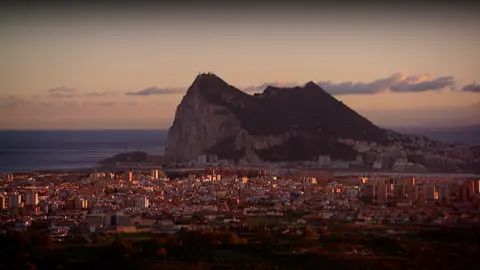 BBC
BBCThe Spanish workers of La Línea de la Concepción are at the ready to celebrate the removal of the Gibraltar border controls. And they have reason to.
This small coastal town bordering Gibraltar is one of the poorest in Spain. A third of people here are unemployed and in some neighbourhoods that figure rises to 80%. Drug trafficking from Morocco and armed gangs have become a problem for police.
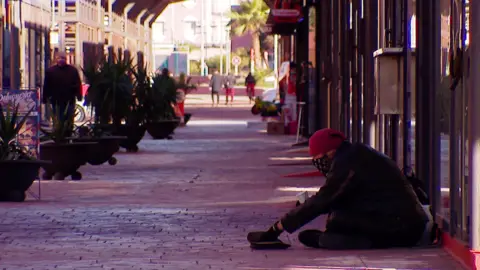
Fifteen thousand residents have jobs in Gibraltar where wages are on average 20% higher. And Gibraltar needs them for the lifeblood of its economy, especially in the nursing, catering and cleaning industries.
What will change
As part of the UK's exit from the EU, the UK and Spain have agreed in principle that the land border will go, possibly within six months, but the terms of the deal first have to be made into a formal treaty with the EU:
- The single road linking the territories will be widened to allow people and cars to travel freely
- Some infrastructure will stay at the border, a few guards will remain on standby, and finalities still need to be worked out such as judging the necessity of certain customs checks away from the border and if so how they would work
- For the border to disappear, Gibraltar will effectively become part of Europe's passport-free travel area - the Schengen zone - though there is a different use of language from both sides on whether it will be "part of", or "connected to" Schengen
- With the border gone, new arrivals will only be checked if they enter by sea at the port and by air
- For the first time, as well as the Gibraltar border guards, there will be guards from the EU border and Coastguard Agency known as Frontex also checking passports.
'Work is far more important than the colour of the flag'
Gib, as it's known, has provided work for La Línea resident Melissa for 20 years. She's a teaching assistant and I meet her as she's about to cross the two border posts on her morning commute, first through the Spanish checkpoint, then immediately after at the Gibraltar side where she'll show the guards her work permit.
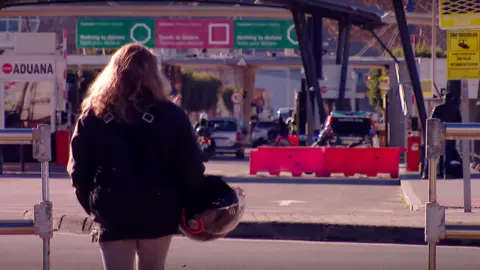
"This is great news for us. In the future it means it'll be easier to simply cross for people [trying] to get jobs. For my son, for example, who has no job," she says. "Work here for me is far more important than what colour the flag is."
Juan José Uceda from the La Línea Workers Association celebrated with a 1940s bottle of Rioja when he heard about the deal.
"We think about the change that this can make psychologically to everybody here, and having no borders to impede us. We are a city born because of the needs of Gibraltar, and we have been suffering for so many years, the queues, the delays on the border and the political issues behind it as well."
Read more from Gavin: Brexit leaves Spain's Costa Brits facing dilemmas
Spain, which disputes British sovereignty over the Rock, has often been accused of deliberately holding up traffic by slowing down checks at the frontier to generate long delays, especially at times of tension between the two sides.
"There are workers, who've been waiting at the border many times for five or six hours without moving, and then on the way back again they have to wait the same time," Juan José complains.
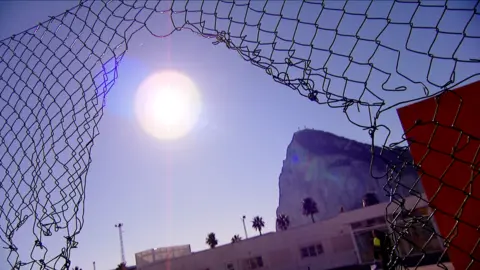
It affects families on both sides. Especially some of the children who go to school on the other side of the border.
"You could see the children eating their breakfast in the cars, waiting. And there are no toilets here. Nothing."
'Like St Pancras station on the Eurostar'
Gibraltar's chief minister, Fabien Picardo, describes the agreement as creating "a common travel area between Gibraltar and the rest of Schengen".
"This is a little like the juxtaposed controls that you would see at St Pancras station when you're going on the Eurostar. You'd go first through British passport control. And then a few steps later you'd go through the French passport control. That is exactly the set-up of what we propose should happen if the European Commission agree, and we elevate our pre-agreement into a treaty."
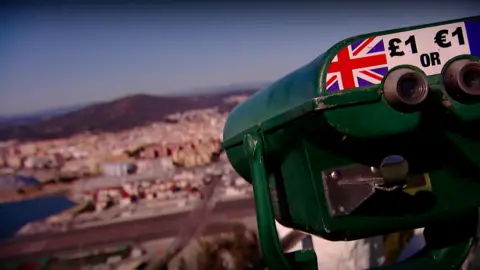
Spanish Foreign Minister Arancha González Laya recently stated that Spain would have to have the "last say" on the airport and port border arrangements, because Spain is the Schengen member country allowing the deal to happen.
That's led to criticism that the move could weaken British sovereignty over the territory, but Mr Picardo says that if the plan goes ahead the decision on who enters Gibraltar will only ever be made by a Gibraltarian guard, so the British Overseas Territory would have "primacy".
"So if we say 'No' you've got to turn your tail and go. Then, you're not coming in through Gibraltar.
"There is absolutely no way that anybody can suggest the agreement we've done or indeed that we would form part of a treaty that would in any way dilute British sovereignty."
Spain: 'I would call it 'co-responsibility'
Spain's Europe Minister, Juan González-Barba Pera, told the BBC that while Spanish claims over the Rock hadn't receded, the deal was not about territorial claims.
"In 2002, [Gibraltar] held a referendum and they rejected the idea of co-sovereignty. Instead of co-sovereignty, I would call it 'co-responsibility' because by this agreement the UK is allowing Gibraltar to participate in certain policies of the European Union to which the UK is not participating."
The Spanish government will outline the details of the agreement in principle in parliament next week.
There has been little chance for Spain's politicians to process the detail of the deal, given that the agreement in principle was rushed through on New Year's Eve, hours before the UK was due to leave the EU.
"There are some people in Spain who are not happy about this agreement because they see it as a lost opportunity to further our claims," says the Spanish minister. He also accepts some in the UK and Gibraltar will be unhappy with the deal.
Risks of a return to old tensions
Despite the issues over who has final say over the deal, Gibraltar seems to have a better relationship with Spain's Socialist coalition government than with previous governments in Madrid.
When the conservative Popular party was in power, the foreign minister claimed the Spanish flag would be flying on top of the Rock after Brexit.
For Gibraltarians there are still painful memories of past tensions. As well as border closures, they endured a 13-year blockade enforced by Spanish dictator Francisco Franco in 1969.
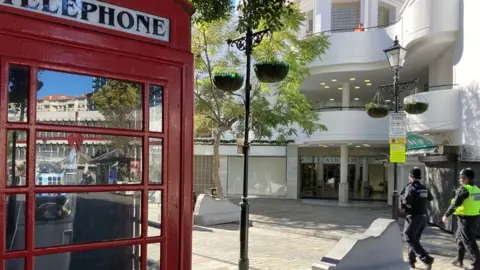
The EU has been credited with helping to smooth out periodic problems between the territories. Now, with the UK no longer a member, and Spain having increased responsibility at the ports, some locals worry it could be a stepping stone towards Spanish rule.
Retired couple Angela Alessio and Harry Brown, who were born on the Rock, are suspicious of Spanish motives.
"I think when I'm not here any more, in the future, this place will be part of Spain. After all we're in the south of Spain." Angela says.
Harry disagrees: "I trust the chief minister, but we have to be careful. One thing will be having European border guards checking passports, but I certainly don't want the Spanish civil guard here doing it on their own."
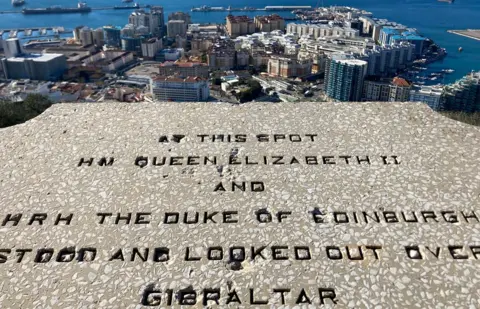
"Spain has always wanted to get hold of Gibraltar," says ex-British military officer Axle. A site foreman in Gibraltar, he moved to La Línea to live with his Spanish wife.
Gibraltarian, British and Spanish officials all insist the border deal is an experiment that will be re-assessed four years after the border has been removed.
They acknowledge it's not without risks. The hope, though, is that with the border gone, trust between these historically fractious neighbours can begin to grow.

Find out more about Brexit

